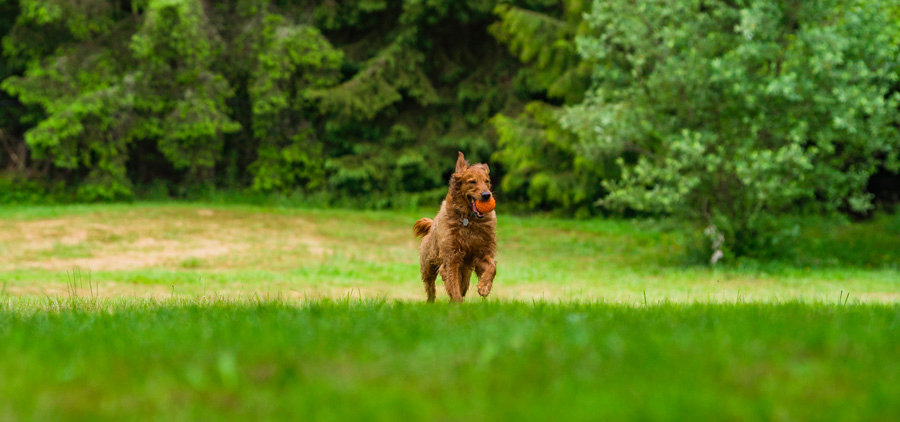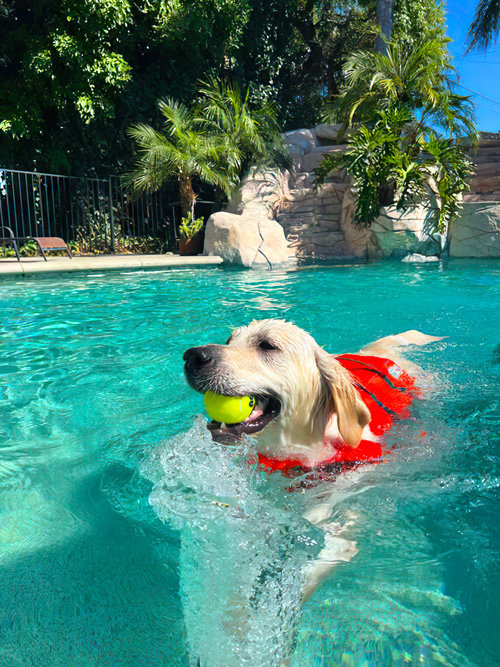Canicross 101: The Ultimate Guide to Running With Your Dog

One of the countless benefits of being a dog parent is having a built-in exercise buddy who is always ready to explore the outdoors and have fun with you. Of course, casual walking, jogging, and hiking are great ways to do so. But if you want to take it up a notch or two? Canicross might be just the activity for you!
What is canicross? Short for “canine cross country,” canicross is trail running — and sometimes racing in competitions — with your four-legged best friend. However, there is much more to it than simply hitting a random path.
Read on to learn a little history behind canicross, why canicross is beneficial, how you and your pup can train for the sport, and how to get started.
So, What Is Canicross, Exactly?
The history of canine cross country
Generations ago, sled dog trainers started training their dogs in Europe during the off-season so that they could stay in shape. (Skijoring and bikejoring are related dog running sports that likely have similar origins.)
Over time, canicross, sometimes considered a form of urban mushing, became a stand-alone sport in its own right. By the early 2000s, canine cross country enthusiasts started to organize competitions.
Although canicross was largely unheard of in the United States until recently, it is quickly gaining popularity as both a form of physical exercise and competition. While canicross USA events do tend to be more prevalent in cooler climate regions of the US (where mushing and sled dog sports are generally more popular due to the accessibility of snow during winter months) many dog parents are becoming increasingly interested in the stand-alone sport regardless of the weather where they live.
What canine cross country looks like and how the sport works
So what is canicross? It is a team sport consisting of one person and one or two dogs running together. The dogs are connected to the human runner via a canicross belt — together, canine and human can run more quickly and keep up their energy levels over longer distances and periods of time.
Canicross USA events are typically 5k (around three miles) but they can be as long as 10k (about six miles) or more depending on the canicross setup.
Proper canicross gear
Most often, the person on a canicross team wears a specially-designed waist belt (aptly called a canicross belt) to which the dog's canicross harness (which is specially designed for pulling) is connected. When two dogs are running together, an elastic line is also used to join them, reducing the shock to the entire team when a dog pulls.
What Are Some Benefits of Canicross?
Why canicross? The sport offers numerous advantages for both dogs and humans.
Physical activity and healthy movement
One of the many things people and their pets — really all living creatures — have in common is a need for regular movement to maintain their physical health. While any level of exercise is better than living a sedentary life, bouts of high-intensity exercise can have particular benefits.
Canicross is excellent for reaching or maintaining a healthy weight, strengthening muscles, and supporting the cardiovascular system.
Fresh air and time outside
Fresh air is also beneficial to pups and their parents. Even the cleanest indoor spaces often contain toxins and allergens like mold, dust, and chemicals from household cleaners. Getting out into nature can help both you and your four-legged companion breathe easier.
Plus the sun is a natural source of vitamin D, which supports strong bones (and which the majority of adult Americans are actually deficient in).
Mental stimulation and enrichment
Canine enrichment is essential to the physical and mental well-being of your dog. Canicross stimulates your pup's mind, fulfills their natural drives, offers exposure to different situations (a key part of healthy socialization), and provides sensory engagement. This all makes it a holistic enrichment option!
Boredom prevention, especially in anxious dogs
Dogs who are anxious, reactive, or otherwise struggle with life in our modern human world can also benefit from embarking on a canicross journey. Many intelligent, sensitive reactive pups can quickly become bored, increasing their anxiety and contributing to long-term behavioral issues. Giving a reactive dog a “job” — an activity they love to do alongside you that has some clear goals — can provide them with a sense of purpose and achievement. Plus positive experiences out on the trail (and maybe eventually in canicross races) can build into greater confidence over time. Who doesn't want to be focused and happy?

Can My Dog Do Canicross? What Are Canicross Dog Breeds?
Your dog doesn't have to be a special breed, size, or even a certain age to participate in canicross. That said: There are certain factors to consider.
How old should a canicross dog be?
Wondering what age to start canicross? Dogs should be fully grown before starting the sport. While it might seem like the ideal activity for an high-energy breed puppy, dogs should be at least a year – or even two years old for larger breeds – before starting.
- Puppies need more rest than adult dogs do.
- Puppies' bones are still growing and their muscles are still developing.
- It's a good idea to talk to your vet about obtaining preliminary hip and elbow radiographs before starting. Your vet can help rule out (or detect) any underlying conditions that could be exacerbated by the pulling force used in canicross. This is a good thing to do before starting any form of canine exercise program!
How big should a canicross dog be?
While a multitude of breeds of many sizes can enjoy canicross, you will have a different experience with a small dog than with a larger one.
Some hauling breeds, such as malamutes, huskies, weimaraners, and vizslas, are especially physically suited for the stamina and energy the sport requires. But don't rule out your furry best friend if they aren't one of these preferred breeds! Any active, healthy dog can be a great candidate for canicross. The sport continues to become more welcoming over time.
On the other hand, dogs with certain health issues — or even just predispositions toward them — might be safer and happier participating in other activities that are still mentally stimulating but involve less intense exercise. For instance, if your pup is prone to joint problems or breathing conditions such as brachycephalic syndrome in brachiocephalic breeds, talk to your vet before giving canicross a try.
How To Train Your Dog for Canicross: Canicross Starter Kit
Before you begin to train your dog for canicross, make sure you have the required gear. There are three essential items you need:
- A pulling harness.
- An elastic leash.
- A canicross waist belt.
The best canicross dog harness will have an ergonomic fit with a y-shaped opening at the neck to support your dog's breathing and movement. A strong but lightweight waist belt and an elastic leash that connects to it complete the setup. Trail shoes are also recommended for the best traction and protection on the human end!
As with any new sport or exercise routine, it’s a good idea to consult with your vet and your own healthcare provider before you begin to train your dog for canicross. We can't stress this safety precaution enough.
How To Train Your Dog for Canicross: Exercise and Movement Cues
Warm up before training to prevent injuries and prepare for exercise. Some canicross trainers prepare active stretches, which encourage the dog to stretch, while others like static stretching, where the person gently stretches the dog’s muscles.
During warm-up, watch for any signs of issues or injuries, such as limping, reluctance, yelping or sensitivity when touched in a specific area, or unusual panting. Seek medical advice before continuing if you notice that your dog has any concerning symptoms.
Cooling down after training is also essential. Gradually slow down from a run to a casual walk to allow your dog’s heart rate and body temperature to regulate.
Teach your dog common canicross cues, such as the following.
- Line out. This is a cue for the dog to stand facing forward with the leash tight in preparation.
- Hike. This means “go” and is most often used at the start of a race.
- Gee for “turn right.’
- Haw for “turn left.”
- On by for “keep going,” often used to go around other canicrossers or ignore a distraction.
- Let’s go to speed up or resume racing.
- Back or behind to prompt your dog to fall behind you or back up.
- Let’s go home to pick up speed, especially at the end of a canicross race.
- Whoa means “stop.”
Once your dog has mastered these skills, you can teach them to pull. Begin using the canicross harness when training for canicross. You can still use a traditional harness for regular walks and other activities, but use the canicross gear exclusively for canicross training.
Some dogs find success when starting with an easy pace, like power walking, and praise when the dog pulls. It can be helpful to have someone else walk ahead of you alongside the dog, encouraging proper speed and pull.

How To Start Canicross With Your Dog
When you and your pet are ready, you can plan how to start canicross. First, make sure you are both well-hydrated. Encourage drinking lots of water starting three hours before you run. It’s also recommended that you not feed your dog for several hours before a race, as running on a full belly can be very dangerous and even fatal.
Be sure to check your pup’s feet and legs before and after runs. Look for swelling, cuts, skin damage, or signs of pain.
Find a soft trail (natural surfaces are recommended) and choose a time to run when there are not likely to be many cars or people passing through.
If you can find other canicrossers in your area, try to meet up and run together. Canicross is a social sport, and practicing together will encourage you both while helping you pick up the sport more quickly.
When you and your dog are ready, enter a race!
Where to Find Canicross Events, Groups, and More
Check out these groups and organizations to find other canicrossers in your area, race info and, perhaps most importantly, to find canicross events.
- Canicross USA: This grassroots organization has chapters across the country. You can find canicross events and race info on the Canicross USA website or the Canicross USA Facebook page.
- Traildogrunners.com: Hosted by the Kenosha Running Company, you can find canicross events, gear, canicross clubs and more on the website and Facebook page.
- North American Canicross: This organization offers titling programs, such as Lifetime Achieved Miles and Race Dog Distance. You can also find out about canicross events and more on its website, Facebook page, or Instagram account.
Facebook also has dozens of canicross clubs, from general groups based on experience level to location-based groups and even groups based on breed. So there’s a good chance you’ll find the perfect fit for you and your best buddy.
The only thing left to do is start racing and have a blast.
Trainer that reviewed this article
There is so much misinformation out there, we want to make sure we only provide the highest quality information to our community. We have all of our articles reviewed by qualified, positive-only trainers. The trainers that review our content are reviewed by other trainers to ensure that we have the best quality filters on our content.
These are the trainers that reviewed this article:
Camilla Echeverria, CTDI, KPA CTP
AKC CGC and Trick Dog Evaluator
Founder and Managing Director of the Northwest School for Dogs
Penny Locke
Proudly offering Positive Reinforcement & Force-free Dog Training
www.allabout-canines.com
Most recent articles

What Is a Reactive Dog? A Complete Guide
Is your dog overly excited or fearful around other dogs? Do they bark, lunge, or whine? You might have a reactive dog. Many dog owners face this challenge. Understanding what a reactive dog is is the first step to helping them. This guide explores the common causes of dog reactivity, explains what makes a dog reactive, and offers practical tips and resources. Let's work together to build a stronger bond with your dog and enjoy stress-free walks.

Positive Dog Body Language: Signs of a Happy Pup
* All Sniffspot articles are reviewed by certified trainers for quality, please see bottom of article for details *

Best Dog Parks Near Me in Austin (Public & Private)
Looking for the perfect dog park near me in Austin? This guide has you covered. We'll explore Austin's best dog parks, from Zilker Park's popular off-leash area to smaller, quieter options. Plus, we'll introduce you to Sniffspot, where you can rent private dog parks near me. Let's find the perfect spot for your furry friend!

Shih Tzu Ownership: Ultimate Guide for New Owners
So, you're thinking about adding a Shih Tzu to your family? Excellent choice! These pups are known for their affectionate personalities and gorgeous coats. But before you bring one home, let's cover some essential shih tzu advice for new owners. This guide, created with insights from experienced Shih Tzu owners, will help you prepare. We'll explore everything from whether Shih Tzus are loyal and affectionate, to if they can be service dogs. Plus, we'll share practical tips on training, grooming, and health. Ready to become a Shih Tzu expert? Let's go!

Dog Parks Near Me: Chicago Guide (Public & Private)
Finding the perfect dog park near me in Chicago can feel overwhelming. But don't worry! This guide explores Chicago's best dog-friendly spots, from popular public dog parks near me to private Sniffspot Chicago locations. We'll cover everything you need for a safe and fun outing, including a handy checklist and tips on dog park etiquette. Whether you want a quick walk, a chance for your pup to socialize, or the best off-leash dog park experience, we've got the perfect spot for you and your furry friend.
Related articles
Top dog guides per area
Dog training guides

Dog Food Aggression: Why You Shouldn't Punish It
Does your dog ever growl when you walk by their food dish? Maybe they get possessive of treats, carrying them far away and giving you side-eye when you start to approach — or snarling at your other pets or children if they get too close.

Scent Training for Dogs: A Beginner's Guide
As almost every dog owner is aware, the nose of a dog is an amazing thing. Just as they can pick up sounds we can’t hear, their sense of smell and ability to pick up scents is well beyond ours. In fact, dogs have 40 times the number of olfactory receptors as humans.

Service Dog Training Costs: DIY vs. Pro
More than 80 million Americans rely on their service dogs to help them navigate the world. Task-trained assistance animals perform a huge range of life-changing—in many cases, life-saving—services: These dogs act as eyes for visually impaired handlers, provide mobility support, alert to seizures and blood sugar crashes, interrupt anxiety attacks, remind their people to take medications, and so much more.

How to Deal With Puppy Potty Training Regression
You thought those dreaded middle-of-the-night potty breaks were over. You were finally free from cleaning up puppy puddles. Then, suddenly, your furry friend starts having accidents again. It's frustrating, right? This puppy potty training regression is more common than you think. Don't worry; we'll help you get your pup back on track. We'll cover the common causes, offer practical solutions, and give you actionable steps to tackle this challenge together.

Dirty Dog Syndrome: Causes, Solutions, and Prevention
It's a cringe-worthy moment every dog owner dreads: your furry friend chowing down on something truly disgusting. If your dog has a penchant for poop, you're dealing with coprophagia. It's more common than you think, and thankfully, often manageable. This article explores the reasons behind dirty dog syndrome, from instinct to learned behavior. We'll also give you practical tips to help break this unpleasant habit.
Dog enrichment guides

Top 10 Dog Water Parks in the US
Do you have a water-loving dog looking to burn some energy? There are countless dog parks to visit throughout our country — but some of them become far too hot in the midday sun to be safe for your pets to play. That’s why we’ve put together a list of some of the best dog water parks throughout the United States! At these locations, your pup can frolic, splash, and swim to their heart’s content.

Best Toys for Herding Dogs: Keeping Your Pup Happy & Engaged
Herding dogs are amazing, intelligent companions. But that also means they need more than just a simple game of fetch. Finding the right toys for herding dogs is key to keeping them happy and stimulated. This article explores some of the best toys for herding dogs, including options specifically for breeds like Border Collies and Australian Shepherds. We'll help you discover the perfect herding toys for dogs to tap into their natural instincts and keep them entertained for hours.

Ultimate Guide: Dog Toys for Aggressive Chewers
Does your dog destroy every toy you give them? Is your house littered with remnants of fabric and stuffing of all different sizes? Are you tired of investing in “indestructible” toys only for your pup to still dismantle—or worse, get bored of—them in just a few days?

Daily Exercise Calculator: How Much Exercise Does Your Dog Need?
Everyone knows dogs need exercise, but how much is enough? Walks are great, but creating a truly balanced fitness plan means understanding your dog's specific needs. This post helps you develop a daily exercise calculator for your dog, considering breed, age, and lifestyle. We'll cover fun activities, understanding exercise intensity, and recognizing when your pup has had enough. Let's create a plan that keeps your dog happy and healthy!

Complete Guide To Herding With Dogs
* All Sniffspot articles are reviewed by certified trainers for quality, please see bottom of article for details *
Dog reactivity guides

Rottweiler Aggression: Truth vs. Myth
Many dogs have gotten a bad reputation over the years for being "dangerous breeds." Rottweilers are among them. Like pit bulls and other large, blocky-headed types of dogs, these powerful and beautiful animals are often assumed to be aggressive.

What Is a Reactive Dog? A Practical Guide for Owners
Does your dog suddenly transform into a barking, lunging Tasmanian devil on walks? It's stressful for both of you. If this sounds familiar, you might have a reactive dog. Understanding what is a reactive dog is the first step to calmer walks. We'll explore the common triggers and give you actionable strategies to manage and modify this behavior. Let's turn those stressful walks into enjoyable outings.

How to Socialize a Reactive Dog: A Step-by-Step Guide
Does your dog display reactivity to other pets or people? Maybe they’re a new rescue pup and are still settling into your home. Or they were sick growing up, so you missed their critical socialization period. Possibly they’ve had a bad experience after being raised as a normal puppy.

What Is a Reactive Dog? A Complete Guide
Is your dog overly excited or fearful around other dogs? Do they bark, lunge, or whine? You might have a reactive dog. Many dog owners face this challenge. Understanding what a reactive dog is is the first step to helping them. This guide explores the common causes of dog reactivity, explains what makes a dog reactive, and offers practical tips and resources. Let's work together to build a stronger bond with your dog and enjoy stress-free walks.

Best Online Dog Training for Reactive Dogs: A Practical Guide
Does your dog's reactivity make walks stressful? You're not alone. Many dog owners face similar challenges. This guide offers practical advice and support for managing reactivity, including finding the best online dog training for reactive dogs. We'll connect you with reactive dog support groups, share training tips, and explore resources like the best dog training app for reactive dogs. Let's build a stronger bond with your dog, together.
* All Sniffspot articles are reviewed by certified trainers for quality, please see bottom of article for details *
Sniffspot community guides

The State of Public Dog Parks Across the United States
From 2009 to 2020, there was a 40 percent increase in the development of public dog parks. Designated spots for canine exercise have become commonplace in every major city in North America — many pet owners won’t even consider renting an apartment that doesn’t have its own fenced-in pet area for their canine companions.

How This Family is Affording Their Dream Property Through Renting it Hourly to Dogs
Thousand Oaks, California has been a safe haven for Sniffspot host, Jen, since childhood. Having grown up in busy Santa Barbara, Jen, an introvert from an early age, would seek out solitude and serenity away from tourists attractions and droves of people visiting from elsewhere. “My grandparents own 60 acres about a 30 minute drive from here, and I grew up spending every summer and every holiday visiting them on the ranch,” Jen explained. “In Santa Barbara, we wouldn't go to the beach on the weekend because that's where everybody was, so you'd find places off the beaten path where the tourists weren't. For me, the ranch was just my happy place.”

Host Tips: Ellen K. What Makes Sniffspot Successful for Me
Ellen is the host of Country Pasture Getaway, one of Sniffspot's most popular sniff spots. She has taken the time to write up the lessons she has learned about how to be a great sniff spot host.

How this Oregon Farmer is Making a Business From Renting Her Land to Dogs
Just 20 minutes outside of the busy city of Portland, Oregon, and settled right on the banks of the Columbia River, you’ll find what countless visitors have flocked to the area in search of – mountain views, crisp, clean air, and running water for miles. What you might not expect to find, however, is a hidden oasis designed just for dogs and their people, owned and operated by a farming couple and enjoyed by visitors on two legs, and four.

Host Tips: Fran T. Providing Great Guest Service at our Spot
Fran is the host of Ranch Setting, one of Sniffspot's most popular spots. She has taken the time to write up the lessons she has learned about how to be a great Sniffspot host.
Top dog trainers in the US
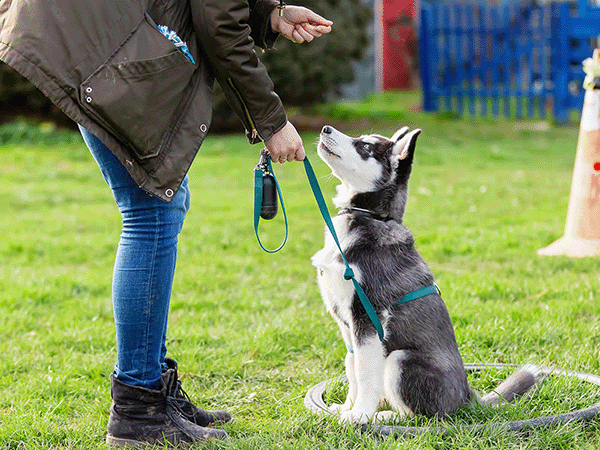
The Best Dog Trainers in the United States of 2025
This is a list of the top dog trainers in the United States, based on votes from the Sniffspot community and the general public.
The Best Dog Trainers in Seattle, WA of 2025
This is a list of the top dog trainers in Seattle, WA, based on votes from the Sniffspot community and the general public.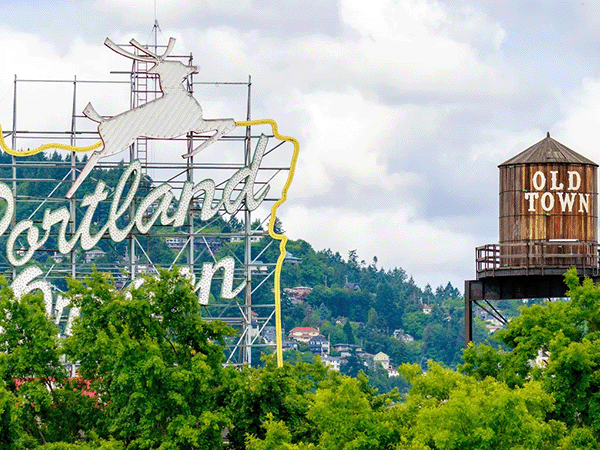
The Best Dog Trainers in Portland, OR of 2025
This is a list of the top dog trainers in Portland, OR, based on votes from the Sniffspot community and the general public.
The Best Dog Trainers in Los Angeles, CA of 2025
This is a list of the top dog trainers in Los Angeles, CA, based on votes from the Sniffspot community and the general public.
The Best Dog Trainers in New York, NY of 2025
This is a list of the top dog trainers in New York, NY, based on votes from the Sniffspot community and the general public.
City dog parks guides

Top 10 Indoor Dog Parks: A US Guide
Looking for a space to play with your dog no matter what the weather’s like outside? Look no further than our list of the best indoor dog parks in the United States! These climate-controlled spaces are growing in popularity as pet ownership increases throughout the country. As a bonus, many of them also offer dog training, boarding, grooming, or daycare services on the premises.

15 Best Dog Parks in the US: Public & Private
Searching for the best off-leash dog parks near you in the United States? Whether you're looking for public dog parks with open spaces or private, fully-fenced areas, this comprehensive guide has you covered. Discover top-rated parks across the country, plus essential tips on what to bring and what to expect for your next adventure.

Dog Parks Near Me: Las Vegas Edition
Looking for the perfect dog park near me in Las Vegas? You're in luck! This guide explores all the best options for your pup, from public dog parks to private dog parks near me on Sniffspot. We'll help you find the ideal spot for playtime, socializing, and fresh air. Plus, we'll cover essential etiquette and safety tips to ensure a happy visit for everyone. Get ready for some tail-wagging fun!

Best Sniffspot Locations: Private Dog Parks Near You
Looking for the perfect dog park? Whether you need a wide-open public space or a private, fenced-in spot, this guide will help you find the best dog parks across the US. We'll cover top-rated public parks, the perks of private dog parks, and even explore Sniffspot locations – giving your pup a safe and fun place to play. Ready to find your dog's new favorite spot? Let's go!

Sniffspot: Portland's Best Private Dog Parks
Ready to discover Portland's best dog parks? Whether you're looking for a public park or the unique experience of a private Sniffspot, this guide has you covered. We'll help you find the perfect spot for your pup, with tips on what to bring, how to prepare, and even understanding dog body language. Plus, we'll explore some top Portland dog parks, including public and Sniffspot options, so you can plan your next dog-friendly adventure in the City of Roses.
Dogs breeds

German Shepherd Dog: Breed Facts, Experience and Tips from 9K+ Owners
Discover the German Shepherd Dog, a breed celebrated for its intelligence, loyalty, and versatility. Known for its impressive size and smooth, graceful movements, German Shepherds excel in various roles, including as guide, therapy, bomb detection, and police dogs, while being a devoted family companion.

Labrador Retriever: Breed Facts, Experience and Tips from 9K+ Owners
Discover the Labrador Retriever, a breed celebrated for its playful nature, affectionate temperament, and trainability. Labradors are known for their friendly demeanor and adaptability, making them perfect family companions and versatile working dogs. As one of the most popular types of retrievers, Labs are ideal companions for various lifestyles and are recognized by the American Kennel Club (AKC) as an excellent breed for families.

Golden Retriever: Breed Facts, Experience and Tips from 9K+ Owners
Discover the Golden Retriever, a popular breed celebrated for its affectionate, playful, and trainable nature. Considered a large dog, Golden Retrievers were originally bred in Scotland for hunting and retrieving game beginning in the 1860s. Today, they're recognized by the Kennel Club and the American Kennel Club (AKC) as one of the most beloved companion dog breeds.

American Staffordshire Terrier: Your Complete Guide
Think American Staffordshire Terriers are tough? Think again. While their muscular build might intimidate some, these dogs are known for their playful and loyal personalities. This guide draws on the experience of nearly 10,000 AmStaff owners to reveal the truth about this often misunderstood breed. Want to learn more about caring for an American Staffordshire Terrier? You're in the right place.

Australian Shepherd Facts: Breed Info & Care Guide
Discover the Australian Shepherd, an AKC breed celebrated for its trainable, playful, and affectionate nature. Despite its name, the Australian Shepherd is actually a native breed to the United States, originally developed to breed on farms and ranches. Considered a medium dog, Australian Shepherds were bred for herding beginning in the 1950s. As one of the high-energy breeds, Aussies are known for their boundless energy and need for regular exercise, including aerobic exercise.
Top dog names in the US
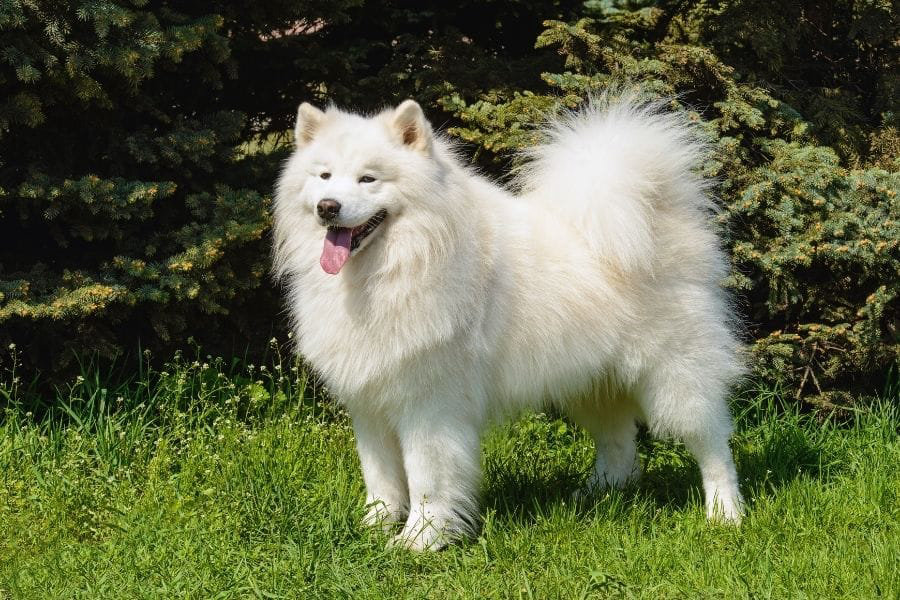
Top 1,000 Most Popular Dog Names
Looking for the perfect dog name for your new pup? We have created filterable lists of dog names from our database of hundreds of thousands of Sniffspot users. You can filter by gender, breed and state to find the most cute, unique and creative dog names.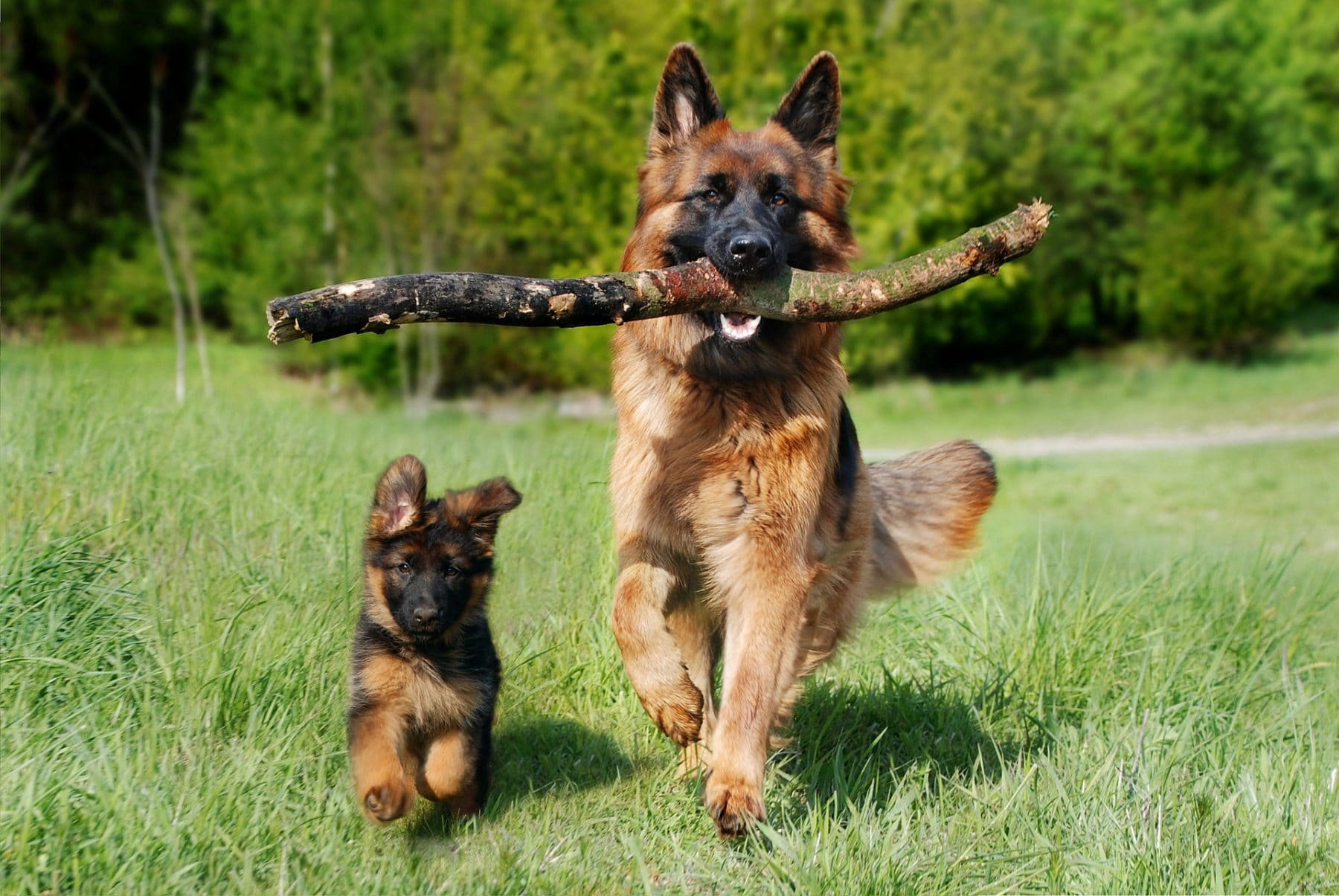
Most Popular Male Dog Names
Looking for the perfect dog name for your new male pup? We have created filterable lists of male dog names from our database of hundreds of thousands of Sniffspot users. You can filter by gender, breed and state to find the most cute, unique and creative male dog names.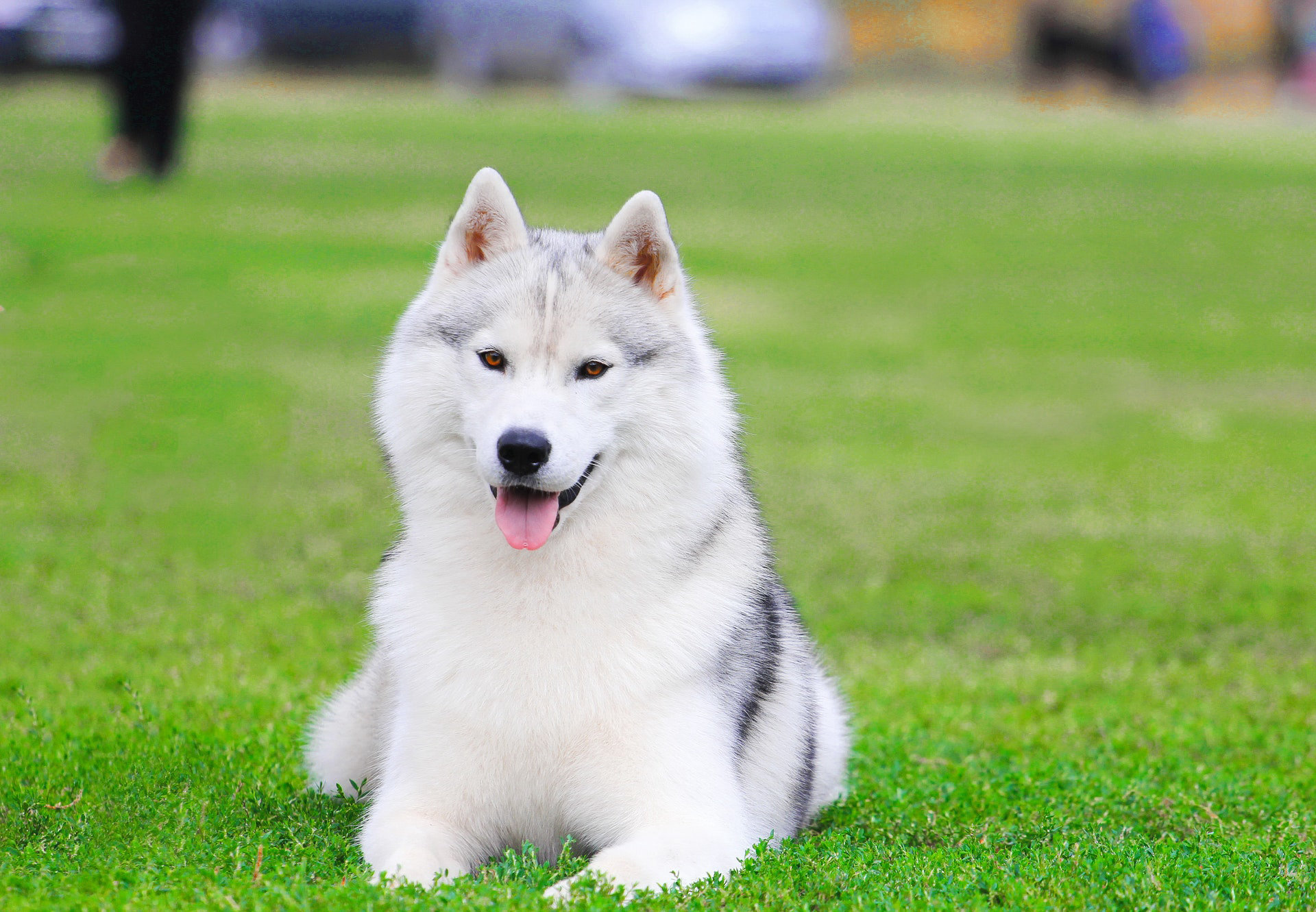
Most Popular Female Dog Names
Looking for the perfect dog name for your new female pup? We have created filterable lists of female dog names from our database of hundreds of thousands of Sniffspot users. You can filter by gender, breed and state to find the most cute, unique and creative female dog names.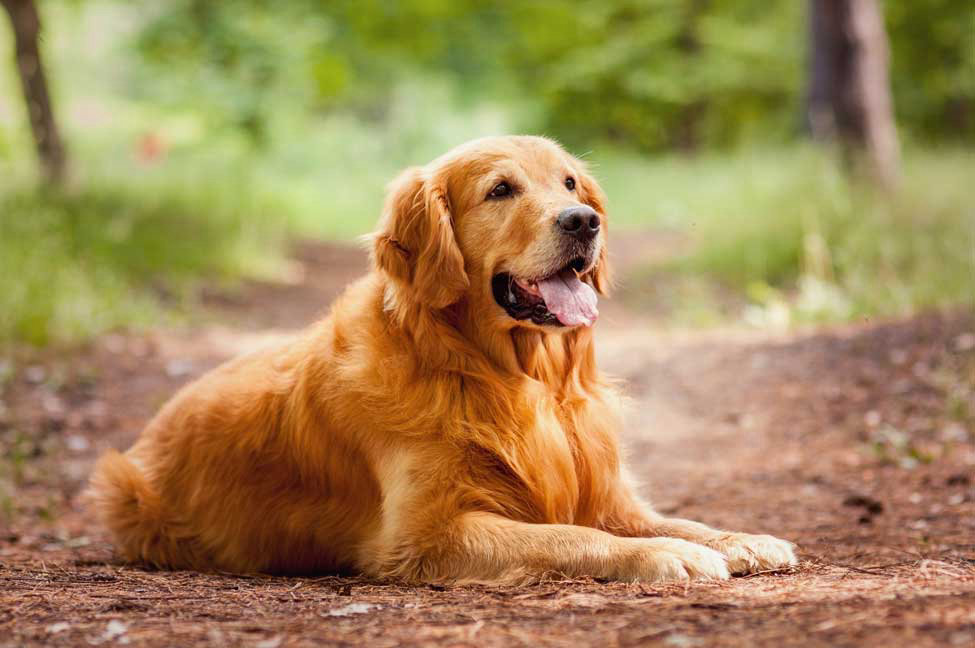
Most Popular Golden Retriever Names
Welcome to our comprehensive list of Golden Retriever dog names, curated from our vast database of Sniffspot users. Filter through hundreds of thousands of options by gender, breed, and state to discover the most adorable, original, and imaginative names for your beloved Golden Retriever.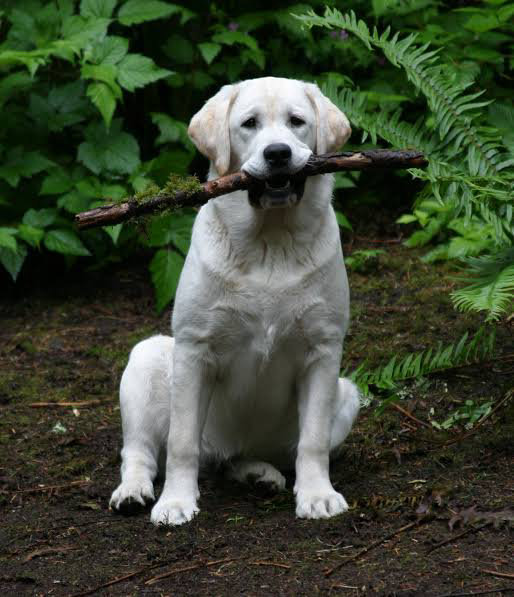
Most Popular Labrador Retriever Names
Welcome to our Labrador Retriever dog names page! Here you can browse through filterable lists of names for your beloved furry friend, ranging from cute and classic to unique and creative options. Our database of hundreds of thousands of Sniffspot users ensures you'll find the perfect name for your Labrador Retriever, whether you're seeking a name for a male or female, based on breed or state.
Top dog rescues in the US

The Best Washington Dog Rescues & Shelters in 2025
This list showcases the top dog rescues & shelters in Washington. These remarkable organizations have been recognized for their unwavering dedication to the well-being of countless dogs.
The Best Oregon Dog Rescues & Shelters in 2025
This list showcases the top dog rescues & shelters in Oregon. These remarkable organizations have been recognized for their unwavering dedication to the well-being of countless dogs.
The Best California Dog Rescues & Shelters in 2025
This list showcases the top dog rescues & shelters in California. These remarkable organizations have been recognized for their unwavering dedication to the well-being of countless dogs.
The Best Florida Dog Rescues & Shelters in 2025
This list showcases the top dog rescues & shelters in Florida. These remarkable organizations have been recognized for their unwavering dedication to the well-being of countless dogs.
The Best New York Dog Rescues & Shelters in 2025
This list showcases the top dog rescues & shelters in New York. These remarkable organizations have been recognized for their unwavering dedication to the well-being of countless dogs.










